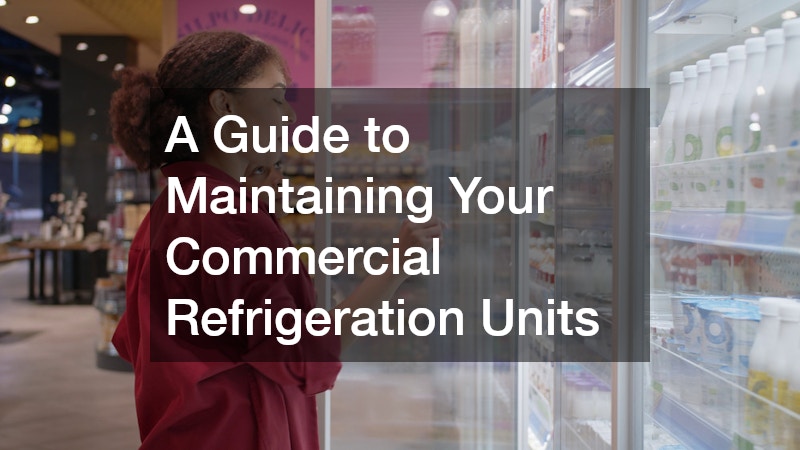Commercial refrigeration units play a critical role in a wide range of industries, from hospitality to healthcare. Whether storing perishable food, pharmaceutical supplies or temperature-sensitive goods, these systems must operate reliably around the clock. A breakdown could lead to inventory loss, business disruptions and unnecessary repair expenses.
Understanding how to properly maintain your commercial refrigeration units is essential for maximising efficiency, extending equipment life and safeguarding your bottom line.
The Importance of Preventative Maintenance
The cornerstone of preserving any refrigeration system is preventative maintenance. Without a structured approach to upkeep, commercial refrigeration units are far more likely to develop issues such as fluctuating temperatures, reduced cooling efficiency and mechanical failures. Over time, these problems can evolve into major breakdowns requiring costly repairs or full unit replacement.
Regular maintenance helps identify minor faults before they become serious. For example, worn door seals, clogged condenser coils or faulty thermostats may seem insignificant at first but can cause considerable operational issues if left unresolved. By scheduling routine inspections and service, business owners can proactively address such concerns and avoid sudden disruptions.
Cleaning as a Critical Routine
Cleanliness directly impacts the performance and hygiene standards of commercial refrigeration systems. Dirt and grime that accumulate on coils, fans and vents can impair airflow and cooling capacity. As the system works harder to maintain the desired temperature, energy consumption spikes and component strain increase.
Internal surfaces should be wiped down frequently to prevent mould and bacteria build-up, especially in units used for food storage. Shelving and trays should be removed and cleaned with food-safe disinfectants. External parts such as door handles and gaskets should also be cleaned to maintain sanitation and reduce wear.
In addition to improving performance, routine cleaning can enhance workplace safety. A clean refrigeration unit is less prone to leaks or electrical issues caused by dust accumulation and moisture build-up. For high-traffic commercial environments, cleanliness must be a standard part of daily operations.
Monitoring Temperature & Performance
Maintaining optimal temperatures is the most fundamental function of any commercial refrigeration unit. Irregular temperature readings often signal deeper mechanical problems such as compressor failure or refrigerant leakage. Therefore, it’s vital to routinely check internal temperatures and calibrate thermostats.
Businesses should invest in accurate thermometers and data loggers to monitor temperature levels consistently. Any deviation from the recommended range should be investigated promptly. In some cases, the problem might be as simple as improper stock placement obstructing air vents, while in others, a failing component may need replacing.
Monitoring energy consumption can also reveal performance issues. A sudden increase in energy bills may indicate that the system is working harder than necessary, possibly due to a refrigerant leak or airflow blockage. Early detection of such issues not only reduces operational costs but also protects stored goods from spoilage.
Servicing & Professional Inspections
While in-house maintenance routines are valuable, they should be supplemented with regular professional servicing. Trained refrigeration technicians possess the tools and expertise to perform deep diagnostics and precision repairs that go beyond surface-level cleaning or inspections.
Professional servicing typically includes tasks such as checking refrigerant levels, inspecting electrical components, tightening connections and testing compressor efficiency. These services help ensure that the system operates within manufacturer specifications and complies with health and safety regulations.
Engaging a licensed technician also ensures compliance with environmental standards relating to refrigerants and waste disposal. Mishandling refrigerants not only violates regulations but can also harm the environment and pose risks to workplace safety.
Extending the Life of Your Equipment
Commercial refrigeration units are a significant investment and maximising their lifespan is in every business owner’s interest. By adhering to a consistent maintenance routine, avoiding overloading and ensuring proper ventilation around the unit, you can significantly extend its useful life.
Operational best practices also play a role in equipment longevity. For instance, ensuring that doors are not left open unnecessarily and that products are loaded in a way that does not block airflow helps maintain efficiency. Training staff to handle the unit properly is another often-overlooked yet crucial element of long-term care.
Using compatible parts and high-quality components during repairs also helps maintain system integrity. Cutting corners with inexpensive or mismatched replacements may provide short-term savings but can result in premature wear or even damage to other components.
Why Commercial Refrigeration Maintenance Matters
Maintaining your commercial refrigeration system is not simply about avoiding breakdowns—it’s about protecting your products, your reputation and your business continuity. A well-maintained system ensures consistent cooling, reduces energy usage and complies with regulatory standards, particularly in industries governed by strict hygiene and safety laws.
In competitive industries where efficiency and reliability are key, proper upkeep of commercial refrigeration is a strategic advantage. It enhances product safety, preserves operational flow and ultimately saves money in the long run.
Commercial refrigeration systems are indispensable assets in many businesses and maintaining them properly is essential to operational success. Through a combination of routine cleaning, temperature monitoring, professional servicing and staff training, business owners can keep their units running efficiently for years to come.
By investing in the care and longevity of your refrigeration equipment, you safeguard both your products and your profitability. Make maintenance a core component of your business strategy—and your commercial refrigeration units will reward you with years of reliable service.
.

